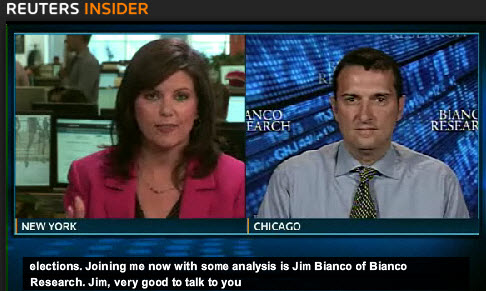Click on picture to view video
Jim Bianco was on Reuters TV yesterday discussing the breaking news that central banks stand ready to act should the Greek election cause market turmoil. To view the interview click on the image above. To view any of our recent interviews click here.
According the Reuters story below, this is the first coordinated central bank action since the fall of 2008 (apparently central bank currency swaps do not count).
The fear is that the Greek election either ends in a stalemate (no coalition) or the leftist Syriza party assumes control. Central banks are hoping to prevent a market sell-off on these outcomes by pre-announcing a coordinated effort in such a scenario.
The reaction to this news was immediate and swift. Risk markets soared in the minutes after the news hit the tape. This is predictable as any hint of central bank liquidity (read: money printing) sends markets soaring.
Bears have wondered when the money printing will stop working. That is the theme of the QE3 stories in the next block. It is impossible to know ahead of time, but we agree with the premise that one day central banks will print too much and it will stop working. Maybe that day will be Monday. Should the Greek election present problems and the market tanks despite promises of liquidity, it could turn ugly as markets also conclude that “liquidity” no longer works, which could be a bigger story than the Greek elections.
Of course this may not happen. The elections could turn out well for the market with a right-wing Pasok/New Democracy victory. Or, the market could soar on bad news because liquidity still matters.
What is different is central banks seem so confident that money printing “works” that they are no longer responding to market stress. Instead they are pre-announcing action in anticipation of market turmoil.
This means central banks are now part of the story instead of merely reacting to it. They now have their credibility on the line. A new sell-off Monday could signal central banks have lost control. We believe this is a dangerous position for them and depending on the results this weekend, it could turn out to be the most important market event since 2008.
- Reuters – Exclusive: Central banks ready to combat Greek market storm
Central banks from major economies stand ready to take steps to stabilize financial markets by providing liquidity and preventing a credit squeeze if the outcome of Greek elections on Sunday causes tumultuous trading, G20 officials told Reuters. A senior U.S. official cautioned that the Greek election will not provide “the definitive signal on what happens next” in the euro zone debt crisis. But if severe market strains emerge after an unusual confluence of three elections this weekend – there are important polls in Egypt and France as well – central bankers are on standby to ensure enough cash is flowing through the financial system. “The central banks are preparing for coordinated action to provide liquidity,” said a senior G20 aide familiar with discussions among international financial diplomats. His statement was confirmed by several other G20 officials. Wall Street stocks jumped sharply on the news, with the S&P 500 and the Dow Industrials both up more than 1 percent. The euro added to gains and U.S. government debt prices fell, boosting yields. - The Wall Street Journal – Draghi Hints ECB Is Ready to Act
European Central Bank President Mario Draghi on Friday suggested the central bank may be ready to answer calls to ease monetary conditions in the euro zone, as risks to the financial system intensify and the bloc braces for elections in Greece this weekend that could decide the country’s future in the currency. Mr. Draghi told a conference in Frankfurt the ECB would continue its “crucial role” of providing liquidity to sound banks against appropriate collateral. He said inflation expectations in the euro zone were well anchored and that there were no inflationary threats. Providing liquidity “is what we have done throughout the crisis, faithful to our mandate of maintaining price stability over the medium term, and this is what we will continue to do,” Mr. Draghi said. The Eurosystem, the ECB and the 17 national central banks that use the single currency “will continue to supply liquidity to solvent banks where needed,” he added. - Reuters – ECB’s Draghi flags euro risks, spurs rate cut talk
The euro zone economy faces serious risks and no inflation threat, European Central Bank President Mario Draghi said on Friday in comments that heightened expectations the ECB could cut interest rates or take other policy action soon. Draghi also said the ECB stood ready to provide further liquidity to solvent banks, stressing that its provision of ultra-cheap 3-year funds, or LTROs, late in 2011 and early this year had averted a major credit crunch. Financial markets are looking to the ECB to take the fast and decisive action the euro zone’s governments have been unable to muster to tackle the bloc’s crisis, which risks spiralling to a new intensity after knife-edge Greek elections on Sunday. “There are serious downside risks here,” Draghi told the annual ECB Watchers conference in Frankfurt. “This risk has to do mostly with the heightened uncertainty.”



What's been said:
Discussions found on the web: